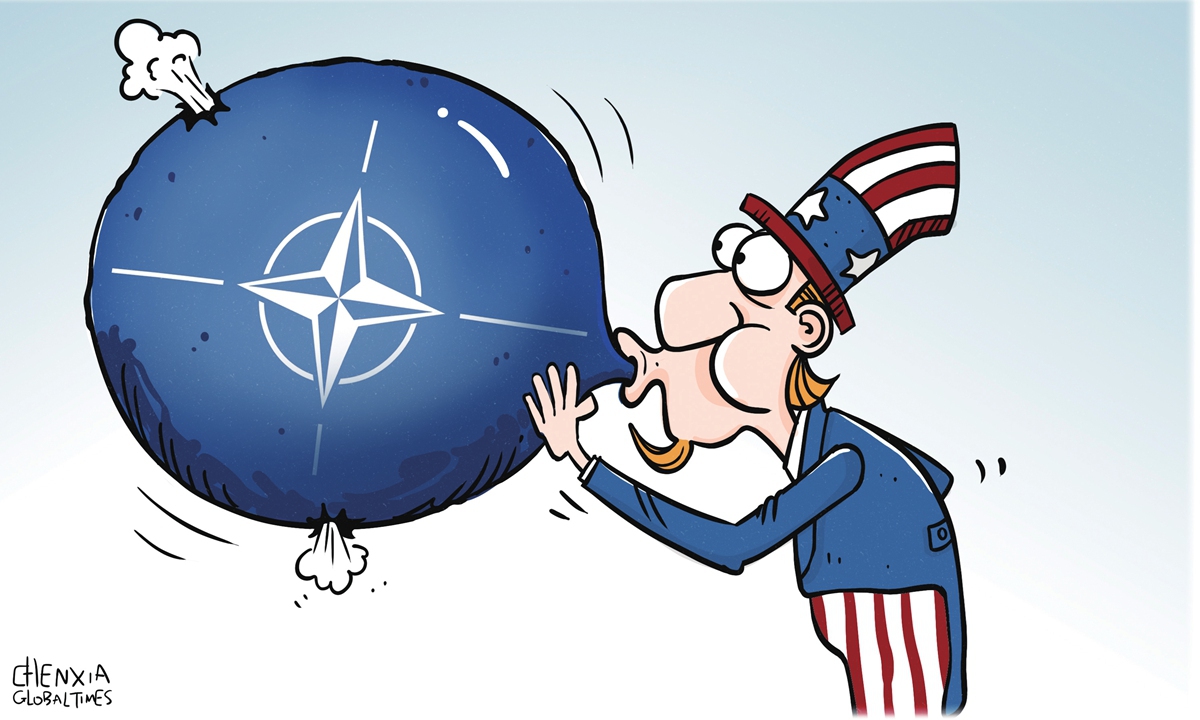
NATO Illustration: Chen Xia/Global Times
In the last resort, the NATO summit in Vilnius failed to make a decision on setting up an office in Japan. "Whatever one says, geography is stubborn: the Indo-Pacific isn't the North Atlantic," French President Emmanuel Macron told the press. He has the guts to remind NATO of its own name. As a legacy of the Cold War, the NATO bloc was born in the North Atlantic and its orbit should remain within the trans-Atlantic region. Obviously, Japan does not fall in that region.
Meanwhile, NATO's intention to break through its geographical borders was clearly revealed in the summit communiqué, in which it accused China of challenging the organization's interests, security and values. It claimed that strategic developments in the Indo-Pacific region have a direct impact on Euro-Atlantic security, making excuses for its proposed enlargement to the Asia-Pacific.
Whether wind direction changes in Asia will actually affect temperatures in Europe, history and reality have already told us that each of NATO's eastward expansion, with no exception, is accompanied by controversy and more instability in the region it newly gobbled. As a military bloc living by the creed of confrontation, NATO has brought conflicts to Eastern Europe as we are witnessing now. It is almost certain that its reach to the Asia-Pacific will bring hostility or even war-flames rather than anything beneficial to the prosperity of the region.
European leaders seem to be caught in a dilemma. As allies of the US, they are restricted by the treaty to speak with one voice, especially within the framework of NATO. But they cannot ignore the fact that, in most cases than not, China is a partner rather than a rival to the EU, and what China presents to Europe is mutual benefit rather than risks or challenges. After all, China has no military presence in the North Atlantic, which means that there is less of a possibility of them sending any troops to the European border. They do need to think it twice whether an unnecessary provocation such as setting up a "landmark" office in Tokyo will alarm China and push it closer toward Russia. They should stay clear-headed and avoid any self-fulfilling prophecy.
Besides, leaders in Europe should be wise enough to tell the real risks on the Eurasian continent. Despite claiming to secure peace in Europe, the US-led NATO has been the source of geopolitical tensions and the US itself is the sole profiteer from a rattled and declining Europe. Since the Ukraine war started more than 500 days ago, the US military-industrial complex has made huge gains from military orders from European countries, while Europe had to bear the risks and cost of the crisis: It has to confront a nuclear power, pay for a bigger energy bill after the Nord Stream sabotage and sterilize the terrible inflation imposed by continuous interest rate hikes by the US.
"Put your sword back in its place, for all who draw the sword will die by the sword." Unrestrained confrontation between military blocs or big powers will lead to destruction. That's what we learned from World War II. To travel afar from home to tilt at windmills, as Don Quixote did, will do more harm than good. European leaders should be the masters of Europe's own destiny.
The author is a commentator on internationals affairs, writing regularly for Xinhua News, Global Times, China Daily, CGTN etc. He can be reached at xinping604@gmail.com.
